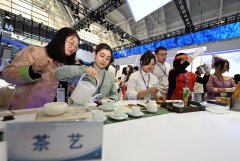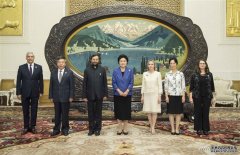Interview: China is making "big stride" in quality educatio
by Xinhua writers Zhang Jianhua and Gui Tao
LONDON, Sept. 7 (Xinhua) -- China is making "a big stride" in quality education and is moving towards education for sustainable development, a top UN official has said.
In a recent interview with Xinhua in London, Irina Bokova, director-general of the United Nations Educational, Scientific and Cultural Organization (UNESCO), highlighted China's progress in reducing poverty and illiteracy and developing quality education for urban and rural areas.
"For obvious reasons, China as a country has an impact on many of the development goals in the world, with its dimensions, with its dynamic development, with its challenges and with its opportunities," she said.
Bokova said UNESCO recognizes the "huge strides" of China in alleviating poverty.
"China has made a huge effort to reduce illiteracy. China has been one of the champions of UNESCO'S framework of working against illiteracy...and China has shown leadership in this process," she added.
Bokova also noted that China has put a lot of emphasis on technical and vocational training. She recalled that, in partnership with Chinese and international institutions, UNESCO convened the Third International Congress on Technical and Vocational Education and Training (TVET) in Shanghai in 2012.
"I think this is one of the areas where China puts an emphasis in order to have sustainable growth and a more inclusive society," she told Xinhua.
In the interview, the UNESCO chief congratulated China and the United States on their recent ratification of the Paris Agreement on climate change, a historic international legal document that outlines post-2020 global climate governance.
"I think China is moving towards education for sustainable development; this is something that we will strongly encourage, and we are ready to work with China," Bokova said.
She went on saying that China has been "a very interesting, encouraging case in point" with the use of new technologies and the open educational resources.
Last year, UNESCO and China's Ministry of Education jointly held the International Conference on Information and Communication Technology (ICT) and Post-2015 Education in eastern China's costal city Qingdao.
"We organized a big fair about the use of these new technologies," she recalled.
Bokova continued that "China is making a big stride in quality education and quality education for the rural areas."
UNESCO has given its patronage to the International Research and Training Centre for Rural Education (INRULED) in Beijing, an important institute under the auspices of UNESCO for education in the rural areas, according to Bokova.
She said it is "a very justifying ambition" to bring the quality of education in rural and urban areas "at the same level".
"I am very happy to have this very strong partnership with China in education," she told Xinhua.















